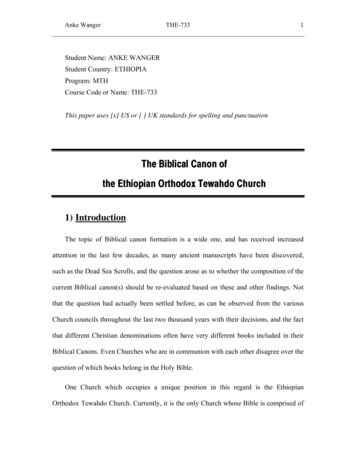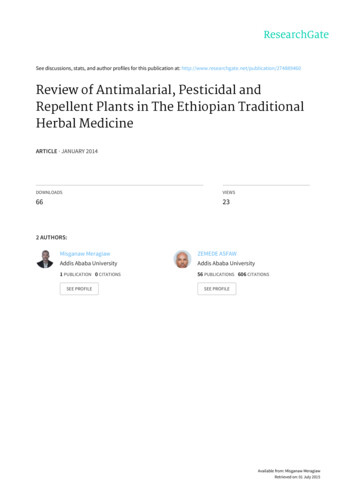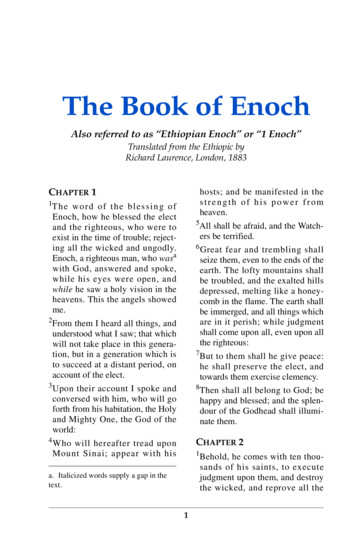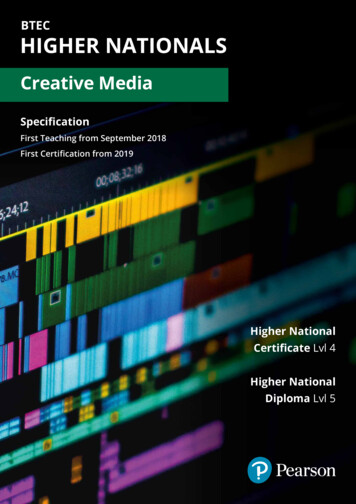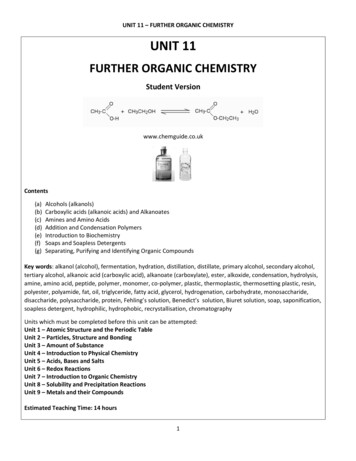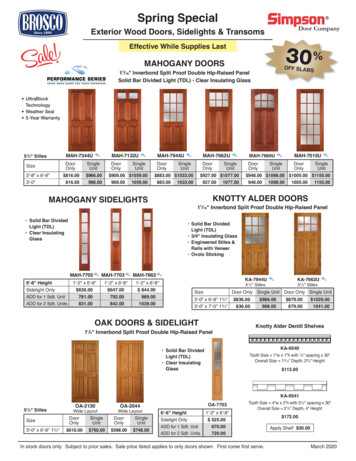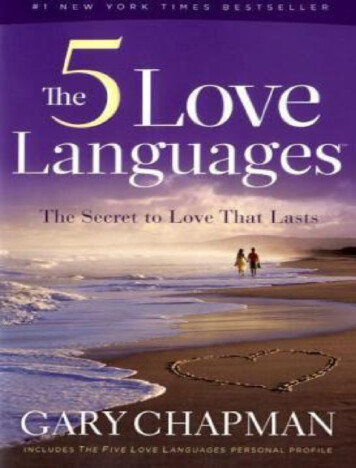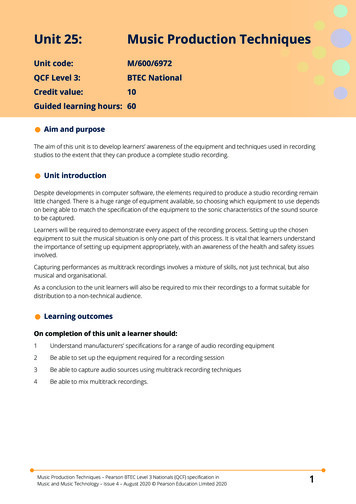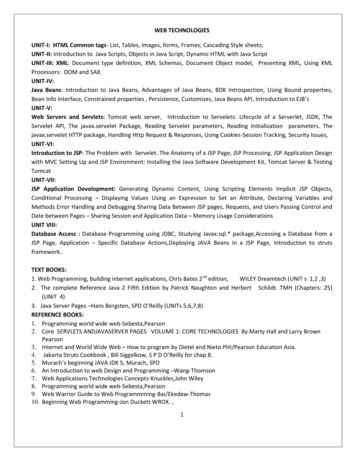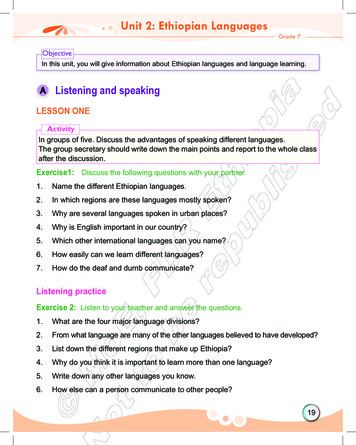
Transcription
Unit 2:UnitEthiopian2: EthiopianLanguagesLanguagesGrade 7ObjectiveIn this unit, you will give information about Ethiopian languages and language learning.AListening and speakingLESSON oneActivityIn groups of five. Discuss the advantages of speaking different languages.The group secretary should write down the main points and report to the whole classafter the discussion.Exercise1: Discuss the following questions with your partner.1.Name the different Ethiopian languages.2.In which regions are these languages mostly spoken?3.Why are several languages spoken in urban places?4.Why is English important in our country?5.Which other international languages can you name?6.How easily can we learn different languages?7.How do the deaf and dumb communicate?Listening practiceExercise 2: Listen to your teacher and answer the questions.1.What are the four major language divisions?2.From what language are many of the other languages believed to have developed?3.List down the different regions that make up Ethiopia?4.Why do you think it is important to learn more than one language?5.Write down any other languages you know.6.How else can a person communicate to other people?19
Unit 2: Ethiopian LanguagesGrade 7LESSON TWOGrammar practice: Adverbs of mannerRead these questions and their answers:1. How did he walk to the classroom?He walked lazily to the classroom.2.How did he write the letter?He wrote the letter neatly.What purpose do the underlined words serve in the sentences?Exercise 1: Answer the following questions about yourself using the words in thebox. Refer to the above examples.happilyslowlycarefullyquickly1. How do you carry your books?2. How did you come to school today?3. How does mother welcome guests?4. How do farmers harvest crops during rainy seasons?ActivityWork in groups of three. The first person will say an adverb e.g. quickly. The nextperson will do an action e.g. walk. The third person will act the adverb by walkingquickly.Take turns to do different actions using adverbs.Exercise 2: Write these sentences in your exercise book using the correct adverbial1.2.3.4.5.6.7.8.9.10.forms of the words in the brackets.My sister laid the table for lunch. (neat)My mother can speak Amharic . (fluent)My brother helps to milk the cows. (usual)Our cousin can fix the wheel. (easy)My father read my report. (happy)My sister talked to the matron. (quiet)We prepared for the family trip. (excited)Grandmother climbed the stairs. (easy)The family members welcomed the visitors. (warm)My aunt carried the baby from the bed. (gentle)20
Unit 2: Ethiopian LanguagesGrade 7LESSON THREEGrammar: Language practicePresent Simple TenseActivityRead this dialogue with a partner paying attention to the underlined words.Examples:(a)(b)(c)Hirut: What do you do every morning?Ali: I greet my parents.Timane : What does your father do everyday?Maria: My father goes to the office.Anite: What language do you speak at school?John: I speak English when I am at school.Make a list of things you and your members do everyday.Exercise 1:Read the words in the box and use them correctly to complete the paragraph.finishworkbe livespeak know lovestartwake upHerpo in Jigjiga. He a merchant. He is not an ordinary merchant, heexports cattle and goats to Europe. He about 12 hours everyday. Helots of languages. He more than eight Ethiopian and three foreign languages.He to learn new things. He has no free time to spend. He early in themorning and work at 7:00 a.m. He work at midnight.Exercise 2: Use the word in brackets to make correct sentences.1.2.3.4.5.6.7.8.9.10.My friend (speak) Amharic when he goes to Addis Ababa.I (talk) to my classmates in English everyday.Tewodros always (try) to learn new languages.Wude (carry) language books everyday.Our teacher (teach) us new words everyday.My sister (write) to me in French every month.Mother usually (talk) to father in Zay language.I sometimes (read) a book in Somali.That man often (watch) English movies.My sister usually (learn) a foreign language quite easily.21
Unit 2: Ethiopian LanguagesGrade 7LESSON FOURUsing: . can . . but . . can’t . , . both . and .Activity 1List the languages you can speak and those you can not speak in your exercise book.Exercise 1: Form correct sentences from the table.Example: He can speak Somali but he can’t speak Wolayta.SomaliHeSheIreadWolayta.hecan’t readGuragigna.shecan’t speakEnglish.Ican’t writeArabic.Sidamacan speakTigrignawriteAmharicbutShinashaAfan Omoro.Activity 2Study the table below. With a partner, form sentences following the example given below.Write the sentences in your exercise book.Example:Abera can speak Somali but he can’t speak rcise 2: Form sentences from the table on page 23 and write them in yourexercise book.Example:22She speaks both Somali and Amharic
Unit 2: Ethiopian Amharic.Guragignaspeaks bothShinashaGrade 7English.andWolaytaFrenchTigrigna.Afan Oromo.Lesson fiveUsing: more/fewer noun than . most nounThe table below shows languages spoken by some students in Grade Seven.Exercise: Use the table to answer the questions which follow in complete sentences.Name of pupilAmharicTigrignaLanguage spokenSidama Which language is spoken by most students?2.Which language has fewer speakers?3.Who speaks more languages, Aberu or Olli?4.Who speaks most languages?ActivityMake a table showing the different languages spoken by your classmates.Your teacher will show you how to put the information on a graph.23
Unit 2: Ethiopian LanguagesGrade 7Grammar HighlightWe use much with uncountable nouns:yy much time, much luckWe do not spend much money.I do not go out much.a few some, a small number:I have a few friends and we meet quite often.When did you see Chala? A few days ago.We use most of the /this/that/these/my/his/Abebe’s . etc.Lesson SIXGrammar practiceUsing: should / shouldn’t . has / have to do /doesn’t have / don’t haveActivity 1Work in pairs to form correct sentences from the table about the use of should e toNegewodoesn’t have toMahiretSegendon’t have tolearn other languages.waste food.grow more trees.boil drinking water.keep money in the bank.eat with dirty hands.burn polythene bags.read books.play on the road.sit in a dirty classroom.Exercise 1: Complete these sentences using should / shouldn’t and the correctform of the word in brackets.1.Merema the exams. She has been studying very hard. (pass)2.You are the secretary of our group. You a pen and papers. (bring)3.We don’t see you enough. You us more often. (visit)24
Unit 2: Ethiopian Languages4.5.Grade 7I am in a difficult position. What do you think I ? (do)I am sorry that I didn’t take your advice. I what you said. (do)Using: has/have to/doesn’t/don’t have to .Activity 2Work in groups of four. Talk about the activities below. Which ones do you do? Whichones don’t you do and why?Examples: I learn English.I don’t fly a plane.1. learn Arabic6.wash your clothes2. fly an aeroplane7.drink beer3. eat food everyday8.say prayers everyday4. sleep in class9.apply for a passport5. go home late10. talk to your friendsExercise 2: Think of the things you have to do in school and those that you don’thave to do. List them in your exercise book and then make sentences .For example: I have to wake up early and brush my teeth.LESSON SEVENExpressing opinions (1)Which of these is a good/bad idea? Give a reason for your answer.1.We should learn more than one language.2.We should cut down all trees in the school compound.ActivityWith a partner, decide whether the following ideas are good or bad.1. People should not go to school.2. Schools should open twice a week.3. Hospitals should be open for 24 hours.4. There should not be any boarding schools.5. We should play the whole day.6. Children should not be immunised.7. All schools should have computers.8. We should go to school.25
Unit 2: Ethiopian LanguagesGrade 7Using: both . and .Exercise: Form sentences using .both. .and. Choose any language you know.Example: My parents speak both English and Amharic.(a) your best friend (Amharic/French)(c)your brother (German/Somali)(b) your sister (English/Shinasha)(d)your uncle (Sidama/Chinese)In groups of five, discuss the languages most commonly spoken in your area anddiscuss the reasons why they are commonly used. Report your findings to the classin writing.LESSON EightExpressing opinions (2)ActivityRead and act the dialogue below between Asnaku and Adil.Asnaku :Good morning, Adil.AdilGood morning, Asnaku.:Asnaku :Do you speak any Ethiopian languages?AdilYes, I speak Sidama and Amharic.:Asnaku :Can you speak Somali?AdilNo, I can’t speak Somali but I can write Wolayta.:Asnaku :Well, I can speak more languages than you.AdilHow many languages can you speak?:Asnaku :I can speak five languages.AdilWhich languages are they?:Asnaku :They are Wolayta, Sidama, Afan, Oromo and Shinasha.AdilYou are lucky. How did you learn all of them?:Asnaku :My uncle who lives in the village speaks many languages. He taught meeach time I visited him during the holidays.Exercise: Write a similar dialogue.26
Unit 2: Ethiopian LanguagesGrade 7LESSON NINEPoemRead the poem aloud and discuss the questions that follow.What a joy it is to live in a country,Where a variety of languages are spoken,With beautiful hills, valleys and mountains,Ethiopia is a wonderful country.What a joy it is to enjoy,The variety of music and dances,wot the national dish from beefAnd injera so sweet and tastyWhat a joy it is to speak,Amharic, Arabic, Somali and Afan Oromo,And English as a foreign language,To communicate with people from different countries.Exercise: Answer these questions about the poem.1.Which country is talked about in the poem?2.What is so sweet and tasty in the poem?3.Mention the traditional languages that are mentioned in the poem.4.Why is English referred to as a foreign language?5.Give a word which has a similar meaning to the word “sweet”.6.In groups, discuss the good things mentioned about Ethiopia.ActivityWrite a three-stanza poem about languages in your country.27
Unit 2: Ethiopian LanguagesBGrade 7ReadingLESSON tenActivityStudy the map of Ethiopia and take note of the languages spoken in each area onthe map. In groups, name the regions where each language is spoken.LANGUAGE DIVISIONS IN ETHIOPIASource: MK Primary Atlas, 200828
Unit 2: Ethiopian LanguagesGrade 7Exercise: Write answers to the following questions based on the map.1.In which regions are most languages spoken?2.In which regions are fewer languages spoken?3.Describe the four languages and ethnic groups in the map.4.With a partner, count and state the total language families in Ethiopia.5.In which region do people speak xamtanga languages?Share your answers with a partner.LESSON elevenComprehensionActivity 1Discuss the following questions in groups.1.If you were to learn a new language, which one would you learn and Why?2.How can we learn other languages?3.What do you think is the most widely spoken language in the world?Read the passage.How do we learn languages?Fatuma and Deborah are great friends. One day, at break time, they discussed how theycould learn different languages. Fatuma speaks more languages than Deborah. Shesays that she learns languages from the people in her community. As people speak, shelistens and imitates them. She is always keen to learn new words and expressions.Deborah says that people should practise speaking the language they want to learn.Even when they make mistakes, she believes practice makes perfect and that the morethey practise, the faster they can learn a language. Listening to the radio and watchingtelevision can help improve a person’s language skills.Fatuma says that she reads many books and uses the dictionary. The dictionaryimproves her ability to spell words correctly and learn different ways of using them. Italso shows how the words are pronounced.29
Unit 2: Ethiopian LanguagesGrade 7Exercise: With a partner, discuss these questions and write the answers in yourexercise book.1.How does Fatuma learn more languages?2.What is Deborah’s opinion about learning a language?3.How can mistakes become a learning tool according to Deborah?4. How helpful is a dictionary?5.What are the various ways of learning a language?6.Why should you listen carefully to the way a language is spoken?Activity 2In your opinion, what is the best way to learn a language? Write a paragraph of aboutfive sentences on the best way to learn a language.CWritingLESSON TWELVEUsing: .and. , . but . , . because .ActivityIn groups of three, read sentences (a) and (b) and study how they are joined togetherin sentence (c).Examples: 1. (a)(b)Halima can speak English.(c)Hailu and Halima can speak English.2. (a)Jemila can speak Somali.(b)Jemila can’t write Somali(c)Jemila can speak Somali, but she can’t write it.3. (a)30Hailu can speak English.Anil speaks many Ethiopian languages(b)Anil finds communicating very easy.(c)Anil finds communicating very easy because he speaks manyEthiopian languages.
Unit 2: Ethiopian LanguagesGrade 7Exercise 1: Join the sentences using and, but, and because1.Gibre knows a lot of words. She reads a lot of books.2.We can speak Amharic. We can speak Somali.3.I asked for an interpreter. I couldn’t understand the language.4.She couldn’t learn the language. She tried very hard.5.Aberu is learning Sidama. My sister is learning Amharic.6.Dana can speak Tigrigna. Dana can’t speak Afanoromo.7.Hailom wants to go to France. He is already learning French.8.Ahaz replied in English. Madina asked in Amharic.Exercise 2: Write your own sentences using and, but and because.Grammar Highlightyy and, but, because are conjunctions. They are used to join two words, phrases, clauses orsentences.yy Use and to join similar ideas.yy Use but to join contrasting ideas.yy Use because to express reason.Examples:(a) The boy and the girl can speak three languages.(b) I couldn’t answer the question because I don’t know French language.(c) They can speak English but they can’t write it well.LESSON THIRTEENRevision ExercisesExercise 1: Choose the suitable word below to complete the sentences.andbutcancan’tboth1.He speaks English he cannot write it.2.She can walk quickly she run.3.You use a dictionary and this book.4.She speaks both English Amharic.fewermore31
Unit 2: Ethiopian Languages5.Aberu Tiki are both clever students.6.Ali speaks languages than Musa.7.Of the two students, Zebene speaks languages.8.She studied Somali cannot spell the words correctly.9.I know l speak and write Somali very well.Grade 710. I tried hard I couldn’t learn the language.Exercise 2: Complete the sentences below by adding the correct word from the listgiven. Write the answers in your exercise oudlywellslowly1.You should walk when crossing the road.2.If you behave , your parents will be proud of you.3.Before you can answer the comprehension questions, you need to read thepassage .4.You may cause an accident if you drive .5.Unless you speak people may not hear what you say.6.You need to learn a language before you can speak it .7.You will not arrive in time if you walk .8.She boarded the bus and sat behind the driver.ActivityWork with your partner. Answer these questions in complete sentences.1.What is your mother tongue?2.What other languages are spoken in your community?3.Which Ethiopian languages do you speak?4.Why is it important to learn international languages like English?32
eat with dirty hands. burn polythene bags. read books. play on the road. sit in a dirty classroom. Exercise 1: Complete these sentences using should / shouldn’t and the correct form of the word in brackets. 1. Merema _ the exams. She has been studying very hard. (pass) 2. You are t
